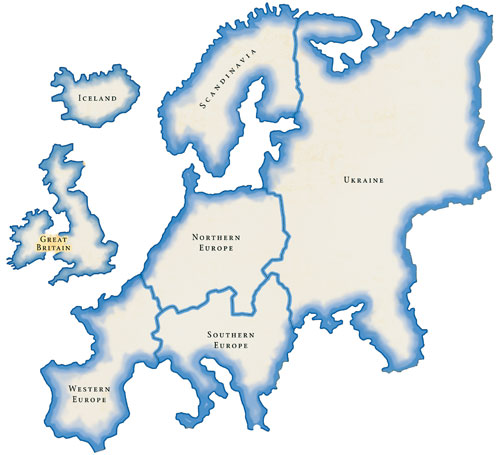
This is the question – more or less – posed to the good people of the United Kingdom (well, some of them at least). But what does it mean to be part of Europe?
Europe, as represented by the classic RISK board, is a curious continent. It is made up of seven territories, as follows:
Iceland: this is pretty straightforward. Iceland is not as big as this in real life, but it is more or less in the right place. A few Faroe Islanders may be a bit put out, but you can’t have everything. For such a remote island, it is well connected, with sea links to Great Britain, Scandinavia and (via Greenland) to North America.
Scandinavia: Scandinavia is, of course, strictly speaking, Norway, Sweden and Denmark. Whereas, in RISK terms, this territory covers Norway, Sweden and Finland – a travesty! It borders Ukraine by land, and Northern Europe, Iceland, and Great Britain by sea.
Ukraine: this territory covers Ukraine, Belarus, Moldova, European Russia and the Baltic states of Latvia, Estonia and Lithuania. It is also the porous border into Europe from Asia, with borders to Ural, Afghanistan and the Middle East, making it very difficult to hold the continent. 5 reinforcements every turn for the continent, but it’s here it may well be lost.
Southern Europe: covering Italy, Switzerland, the Balkan states, Greece, Austria, the Czech Republic, Slovakia, Hungary, Romania and Bulgaria. It is a gateway to Asia (Middle East) and Africa (Egypt and North Africa) with six neighbouring territories in total.
Northern Europe: is really just Germany, Denmark and Poland. It has no external boundaries, so if you do hold the rest of Europe, then this is pretty much going to be sitting with a single army for the whole game.
Western Europe: covers Spain, Portugal, France, Belgium, Luxembourg and Netherlands. Also some smaller territories – Monaco, Andorra and Gibraltar (who have a say in the EU referendum for some reason).
Great Britain: actually represented on the board as the whole of the British Isles, including Ireland. The geography is slighty askew, in that Britain is as close to Iceland as it is to mainland Europe, and almost as close to North America as it is to Denmark – a comforting thought for Atlanticists everywhere.
Buffered by European allies on every side, it occupies a strong defensive position. If Great Britain were to leave Europe and either go it alone, or even join North America, it would be beset by hostile forces surrounding it. The greatest of temptations for anyone with a mission card requiring the conquering of continents, too.
In short, for Great Britain to leave Europe would be all RISK and no reward.







